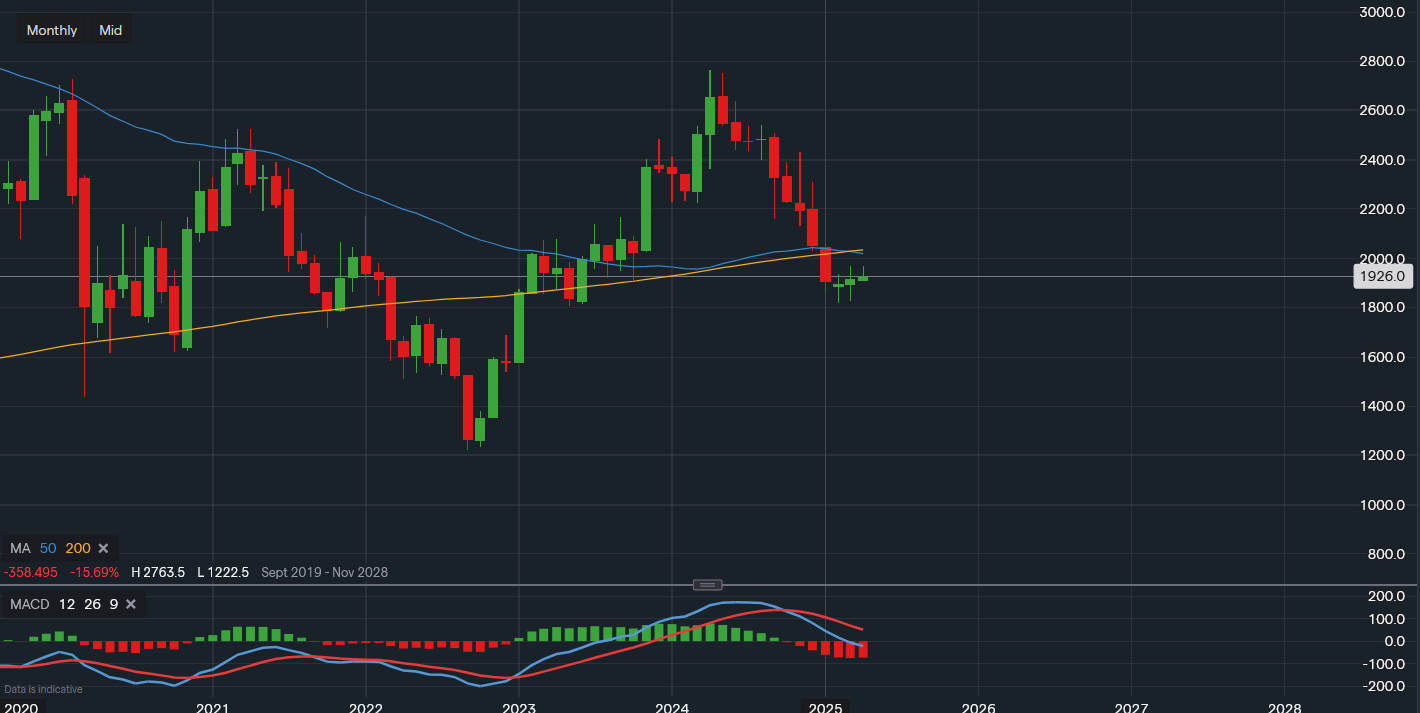General Dynamics (GD) Fundamental and Technical Stock Analysis: Can the Defence Prime Keep Outperforming?
$364.70
04 Mar 2026, 12:54

Chart & Data from IG

Following the recent resignation of Primark CEO Paul Marchant—who admitted to an "error of judgement" involving a woman in a social setting—investor attention has turned sharply to Associated British Foods plc (LSE: ABF). The news has added to existing uncertainty surrounding the company, and its share price performance reflects that caution.
As of the latest data, Associated British Foods stock is trading around 1,926p per share, marking a decline of approximately 6% year-to-date. The stock is facing notable pressure amid wider concerns over leadership changes and a fragile global economic backdrop.
From a technical perspective, the outlook for ABF shares leans bearish:
Death Cross Alert: The 50-day moving average (MA) has recently crossed below the 200-day MA, a technical pattern often referred to as a "death cross"—typically viewed as a long-term bearish indicator.
Price Below Key Averages: The current share price has also dipped below the 200-day MA, reinforcing signs of ongoing weakness.
MACD Bearish Crossover: The MACD indicator has turned negative, which historically has preceded further downward movement in ABF’s share price.
Support Zone: The next key downside target lies around 1,230p, a level that appears increasingly likely if bearish momentum persists.
Resistance Zone: The 50-day and 200-day MAs, currently between 2,020p and 2,030p, are acting as immediate resistance. A decisive break and daily close above this range would be required to reassess the technical outlook and potentially signal a bullish reversal.
Given the recent leadership change, ongoing macroeconomic headwinds, and deteriorating technical structure, the risk-to-reward ratio currently skews unfavourably for new long positions. The short-term outlook remains cautious unless the stock can reclaim key resistance levels with conviction.
Financial Performance:
Revenue and Profitability: In the fiscal year ending 14 September 2024, ABF reported revenues of £20.1 billion, a 4% increase at constant currency compared to the previous year. Adjusted operating profit rose by 32% to £1.998 billion, reflecting a strong margin recovery across the group as input cost pressures eased.
Segment Performance:
Primark (Retail): Primark's profits surged by 51%, contributing significantly to the group's overall profitability.
Grocery Division: Including brands like Twinings and Kingsmill, this segment experienced a 14% increase in earnings.
Cash Flow and Investment: The company generated £2.87 billion from its operations, achieving a cash flow margin of 14.32%. Gross investment for the year totaled £1.281 billion, indicating a commitment to growth and expansion.
Recent Developments:
Leadership Change: Paul Marchant, CEO of Primark, resigned following an investigation into inappropriate behavior. Eoin Tonge, ABF's finance director, has assumed the role of interim CEO. Such leadership transitions can introduce uncertainty and may impact the company's strategic direction.
Ownership Structure: Wittington Investments Limited increased its voting rights in ABF to 58.09%, up from 57.09%, potentially influencing corporate governance and decision-making processes.
Market Performance and Valuation:
Share Price Trends: As of 1 April 2025, ABF's share price stood at £19.40, marking a 22.62% decline over the past year and positioning it 29.66% below its 52-week high of £27.65.
Valuation Metrics: The stock has a price-to-earnings (P/E) ratio of 9.85, which is below its five-year average of 14.3, suggesting potential undervaluation.
Analyst Forecasts: Analyst consensus indicates a median 12-month price target of £22.00, representing a 15.18% potential upside from the current price. However, targets range from £17.30 to £31.00, reflecting varying perspectives on the stock's future performance.
Considerations:
Market Challenges: ABF's sugar division faces challenges due to declining European sugar prices, which could impact future profitability.
Economic Environment: The broader economic landscape, including consumer spending patterns and input cost fluctuations, may influence ABF's performance across its diverse business segments.
Conclusion:
ABF demonstrates robust financial health with significant profit growth and strong cash generation. The recent leadership change at Primark introduces an element of uncertainty, and challenges in the sugar division warrant consideration. The current valuation appears attractive, with a P/E ratio below historical averages and analyst forecasts suggesting potential upside. However, prospective investors should weigh these factors alongside their risk tolerance and investment objectives.
Given the mixed outlook, a cautious approach may be prudent. Potential investors might consider monitoring the company's response to recent developments and market conditions before making investment decisions.
(Sources: reuters.com, tipranks.com, ftmarkets.com,